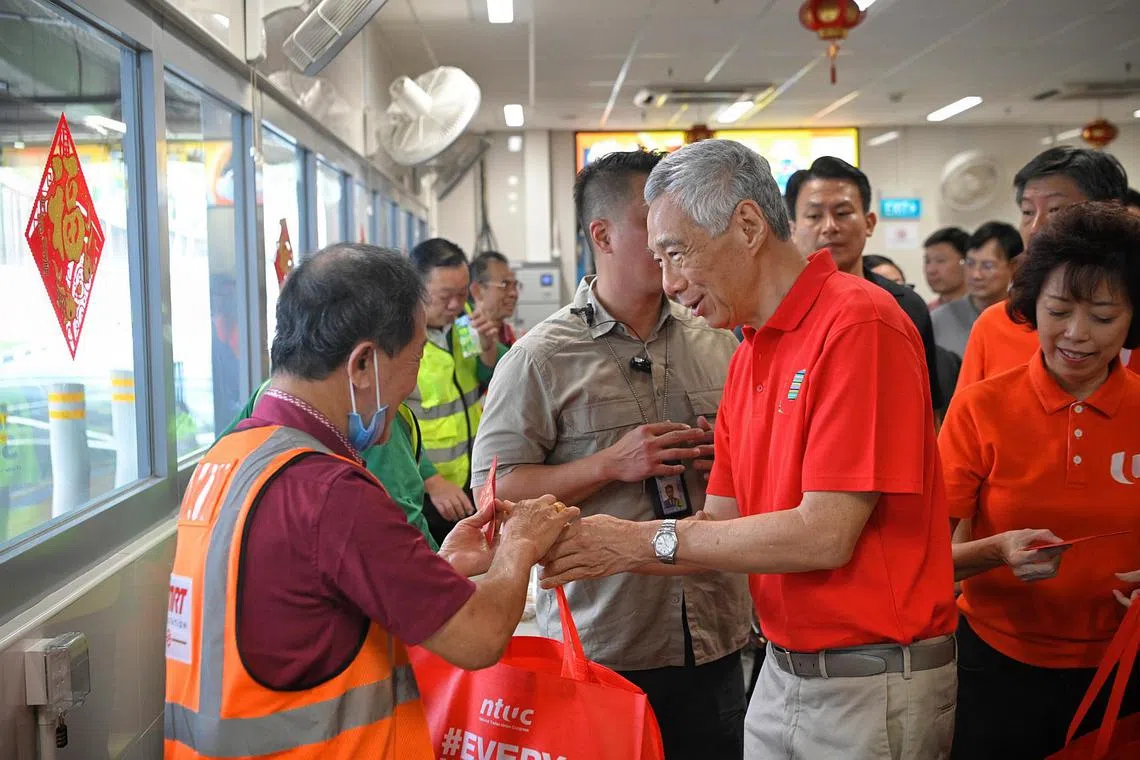Singapore expects to avoid economic recession but growth also depends on external conditions: PM Lee
Sign up now: Get ST's newsletters delivered to your inbox

PM Lee Hsien Loong (right) distributing red packets to public transport workers at the Woodlands Integrated Transport Hub on Jan 21, 2023.
ST PHOTO: MARK CHEONG
SINGAPORE – The Republic expects to avoid an economic recession
Speaking to the media after meeting bus drivers and transport workers on Saturday morning, PM Lee said there is a need to look at what China does after ending its zero-Covid policy, and if the Chinese government will return to normal operations.
The Government, he added, has made preparations for all possibilities and Singapore will try its best to strive for better results.
Speaking in Mandarin, he said: “This year, we anticipate that economic growth will be slower because there is the possibility that other countries will encounter recessions.
“We expect that we can avoid an economic recession and still grow our economy, but this is dependent on external conditions.”
During his visit to the bus interchange at Woodlands Integrated Transport Hub, PM Lee thanked public transport workers, including bus drivers and administrative staff, for providing essential services during the Chinese New Year period.
He said that after a difficult two years, Chinese New Year celebrations are “back to normal again”, after the lifting of Covid-19 restrictions.
PM Lee added: “If you look around the world, there are so many dark clouds outside us, around us, and we need to distinguish ourselves and make the most of our advantages to keep ourselves safe. This year, the Year of the Rabbit, I have every confidence that we will be able to do that.”
Visiting workers during the festive season is an annual tradition for the labour movement. It is usually held on the first day of Chinese New Year. Gift bags containing red packets, mandarin oranges, a carrier pouch and disposable face masks were given out to public transport workers.
PM Lee was accompanied by Senior Minister of State for Manpower and Defence Zaqy Mohamad, Senior Minister of State for Transport and Finance Chee Hong Tat, and Land Transport Authority chief executive Ng Lang, as well as National Trades Union Congress (NTUC) president Mary Liew and secretary-general Ng Chee Meng.
On Jan 17, the Singapore Tourism Board forecast that international visitor arrivals to Singapore are expected to hit 12 million to 14 million in 2023, with full tourism recovery expected by 2024.
Tourism receipts are also expected to climb to $18 billion to $21 billion, with the bullish forecast coming on the back of better-than-expected numbers in 2022, which ended with 6.3 million international visitor arrivals and estimated tourism receipts of $14 billion.
And amid global headwinds, Singapore’s port remained resilient despite overall trade and container volumes being adversely affected by the slowdown in production and consumption in the major economies.
Singapore handled the second-highest number of containers on record in 2022 to retain its position as the world’s largest transshipment port, even as global container trade declined.
In 2022, Singapore’s economy grew by 3.8 per cent, slowing sharply from the 7.6 per cent growth achieved a year earlier, according to advance estimates published by the Ministry of Trade and Industry on Jan 3.
In October 2022, the International Monetary Fund said global growth is forecast to slow from 6 per cent in 2021 to 3.2 per cent in 2022, and 2.7 per cent in 2023.
In a Chinese New Year message earlier on Saturday, PM Lee called on Singaporeans to stay vigilant against Covid-19 amid the festive celebrations,
Asked about the feedback he got from transport workers, PM Lee said he was told that service 950 – which plies the Singapore to Johor route – is very full, but the other services are up, too, because people are shopping and travelling.
Mr Ng, speaking to the media, said bus drivers now earn likely up to 50 per cent more than what they did 10 years ago, and the push to better their welfare in terms of rest areas, lounge areas and better work prospects is ongoing.
He said: “More critically, NTUC wants to continue its focus on workers’ interests, whether it is the mentorship and mental well-being for younger workers – all the way to the senior workers, looking at their retirement adequacy, extended employment, so that they can continue to earn a good living, have the dignity of work and have a good segue way into retirement.”
In a statement on Saturday, NTUC said public transport is an essential service for the economy and communities, and it is vital to develop a strong Singaporean core within the public transport workforce. It said: “NTUC recognises the need to improve career prospects by upskilling our public transport workers, especially our bus captains.”
In 2012, NTUC worked closely with industry stakeholders and tripartite partners to introduce a progressive wage structure for the transport and logistics services cluster, covering bus drivers among the worker groups.
“Since then, close to 10,000 public transport workers from the four public transport operators in Singapore have benefited, where the average starting basic salary is now $2,150 as compared with $1,375 prior to 2012,” said NTUC.



